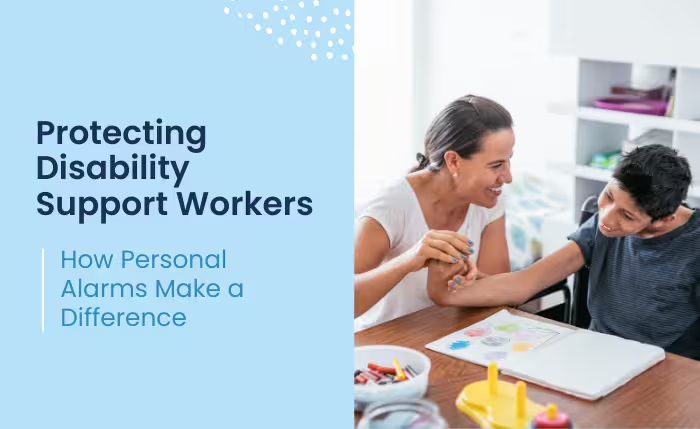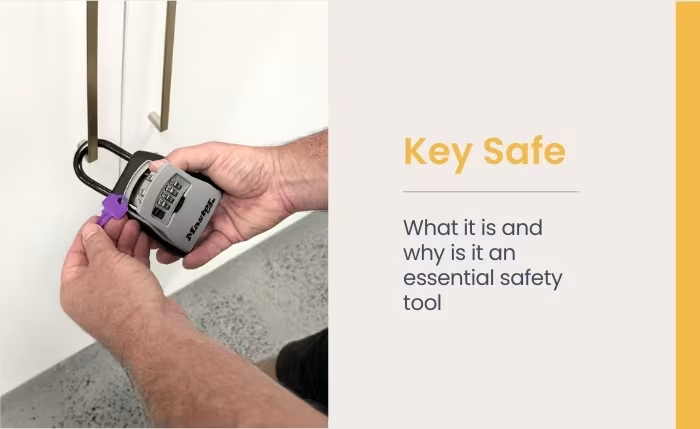Vision Loss and the Benefits of a Medical Alarm - MePACS
.jpg)
Blindness and vision impairment are a significant concern in Australia.
It is estimated that there are more than half a million people who are blind, or vision impaired currently living in this country. Among these, more than 66,000 people are classified as blind. The majority (60 per cent) of people living in Australia who are blind or vision impaired are aged 65 years or older.
Thankfully, there are a variety of safety devices and support services available to help people who are blind and vision impaired, enhancing their safety and independence. These include assistive technology, home modifications and access to Government funding, such as the NDIS.
In this article we take a look at some assistive technologies available to help those with vision loss to maintain their independence, navigate around the community and signal for help in a medical emergency.
What is a vision disability?
Vision impairment is the partial or full loss of sight in one or both eyes.
It can be caused by a disease or medical condition, old age or an accident. Vision impairment can also be present from birth.
What are the types of visual impairment?
Vision impairment is a reduction in a person's ability to see that cannot be fully corrected with glasses or contact lenses. This can range from mild vision loss to complete blindness.
'Legally blind' is a government term used to identify people who are eligible for particular benefits and services. A person is legally blind in Australia if they cannot see at six metres what a fully sighted person can see at 60 metres, or their field of vision is less than 20 degrees in diameter.
Someone who has vision impairment or low vision may have some ability to see. However, their loss of vision could be severe enough to affect their ability to perform a variety of daily tasks.
Vision impairment may be caused by various medical conditions, including:
- Age-related macular degeneration
- Cataracts
- Albinism
- Glaucoma
- Stroke
- Diabetes complications
What equipment is needed by visually impaired people?
The support aids that a person with vision loss need depend on the type of medical condition they have, but there are a number of assistive technology options available to enhance their sense of safety and independence.
These aids can increase mobility around the home and community, making it easier to get around safely and prevent chances of injury.
Assistive technology can include:
- Mobility, identification and long canes
- Smart glasses
- Screen readers
- Medical alarms
- Hand magnifiers
- Braille displays and note-takers
There's also a variety of applications that people can download on smart phones or computers to help them navigate their device and communicate with others. A list of these technology options is available on the Blind Citizens Australia website.
Assistive technology under the National Disability Insurance Scheme (NDIS)
People who are blind or have vision impairment may be eligible to access the products and services they need through the NDIS.
As a category of funding, capital supports help NDIS participants afford necessary safety equipment, home or vehicle modifications and assistive technologies.
Assistive technologies help people with vision impairment to perform tasks they may find challenging to complete, which further contributes to their ideal independent lifestyle. For those who have vision loss, this can include canes, screen readers and safety devices such as medical alarms.
Medical alarms, also known as personal alarms, enable the wearer to signal for help in the event of a medical emergency - whether they are worn around the neck, clipped to pants or on the wrist, they are an essential safety device for many Australians living with disability, including those who have vision impairment.
Medical alarms as Vision Loss Support Aids
Finding the right emergency alarm for particular vision needs is important. MePACS offers a range of safety devices to ensure that our clients have the freedom of choice to suit their lifestyle.
With a MePACS personal alarm, a signal for help is sent to our 24/7 emergency response team of trained professionals, who will assess the situation and call for a family member, friend, neighbour or emergency services - whoever is the most appropriate contact at the time. Our response team will also continue to check in until help arrives.
The range of MePACS medical alarms includes:
- Home Alarms, a lightweight pendant for safety in the home and garden
- Mobile Alarms with fall detection and GPS technology, conveniently providing reassurance when out and about
- Solo Watch Alarms with fall detection, GPS technology and health metrics to help you stay confident and independent
For Home and Mobile Alarms, there's also a variety of accessories available to help people with vision loss easily signal for help, such as:
- Vibrating pendants, which confirm a signal for help has been sent with short vibrations
- Jelly bean buttons, which can be secured to a table in a commonly used area for convenient signalling
NDIS funding for Personal Alert Alarms
MePACS personal alarms are safe, easy to use and relatively low-cost compared to other assistive technologies.
People can apply for an NDIS funded personal alarm directly or through their Plan Manager. The friendly team at MePACS are always happy to help.
- Check the NDIS Plan : Funding for personal alarms can come from the Core Supports Consumables budget for low-risk, low-cost AT. Participants can also use their Capital Support budget.
- Choose a personal alarm: Participants then choose the personal alarm that best meets their needs and lifestyle.
- Request a quote: Participants can request a quote or invoice from MePACS to submit to the NDIS.
- Submit the quote: A Plan Manager may submit the quote for processing. If a partipicant's NDIS plan is self-managed, they can submit the quote directly.
- Get the alarm: Once the quote is approved by the NDIS, we will quickly process the participant's application and submit the invoice directly to the NDIS.
Conclusion
Having the right medical alarm for your disability or lifestyle makes all the difference. A MePACS medical alarm can help people with vision impairment feel safer and more independent at home and away.
*This information is for educational purposes only and does not substitute for professional medical advice. For any medical concerns or conditions, speak to a health specialist.

.avif)



